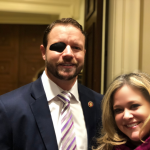Teenagers are rebellious and they do stupid things. Given the range of options available to them -- from drinking and driving to unprotected sex -- vaping is a rather mild vice. However, it is still harmful, so laws need to be in place to prevent teens from getting them.
health policy
The other day, CNN hosted a 7-hour long climate change town hall for the Democratic presidential candidates. This, of course, isn't the only scientific topic of relevance to Americans. If we were running the debate, we would ask questions about the following science and health topics: Vaccines, opioids, energy policy, alternative medicine, vaping, stem cells, and genetic engineering.
While an investigation is underway into the exact nature of the problem, so far the likeliest explanation is that improper use of vaping devices has led to illness, or the death, of some users. But that sort of nuance isn't governing the thinking of the FDA or CDC officials, both of which are allowing myths and fearmongering to drive their policies and public statements.
Since our founding in 1978, ACSH has stood for evidence-based science and health in combination with free markets and individual liberty. We feel that an educated public should be free to make its own decisions without a "nanny state" micromanaging our behavior. Occasionally, however, our guiding principles encounter intractable problems. Today, two of the biggest such problems involve public health.
It shouldn't really be a surprise when this California city, which doesn't have a clue about the importance of public health, implements a policy that will help kill people.
To this question, James Mattis once famously answered, "Nothing. I keep other people awake at night." But not everybody is as courageously confident as this General. So what are the top health and safety concerns on the minds of security officials? Let's take a look.
There are 14 new HIV infections in an outbreak that's hit homeless drug users in the Seattle area. These are the predictable consequences of a feckless public health policy, and one that lacks compassion.
California is a trendsetter. It’s home to world-class wine, championship basketball teams, beautiful weather and legendary cities like San Francisco. But sadly, it's also a trendsetter when it comes to wrongheaded public health policy. There’s no better example of this than Proposition 65, a law that as of 2016 has cost California businesses close to $300 million.
Physicians from across the political spectrum and the country, representing nearly every specialty, came to Washington, DC last week. They did so to advocate for patients, spotlighting many hidden ways healthcare dollars are wasted.
Chickenpox is wrongly thought of as a harmless disease. Prior to widespread vaccination, chickenpox hospitalized 13,000 Americans and killed 150 every year. But even if it was a harmless infection, wouldn't we want to vaccinate our children to spare them the pain of shingles in their later years?
We no longer provide treatment to drug-addicted or mentally ill people who cannot, or will not, care for themselves. Society has decided that it's more compassionate to allow these unfortunate souls to make their own choices, even if those choices are irrational, self-destructive and dangerous to the community.
Better safe than sorry. That's a great lesson for a child when a parent explains why she should wear a helmet when riding her bicycle. But that refrain makes for terrible public health policy.











